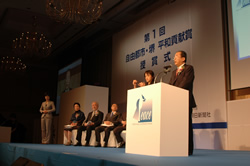Mayor’s Address
Keisuke Kihara, Mayor of Sakai City

First, I would like to express my deep gratitude to you all for joining me here today for this, the first award ceremony for the SAKAI Peace Contribution Award.
Further, I would like to express my warmest congratulations to today’s award recipients, Mr. Jehan Perera, Dr. Hideto Yoshioka, everyone from the Japan-Nepal Female Education Association, their families, the National Peace Council of Sri Lanka, Japan Heart, and everyone involved with these organizations and their work.
Today, our human race faces many problems of global magnitude, including issues of peace and human rights, ethnicity , as well as environmental problems. To overcome these, we need to concentrate all the wisdom of all races, and indispensable to this are mutual understanding and cooperation which transcend nationality and ethnicity.
However, even today, nearly sixty years since the United Nations adopted the Universal Declaration of Human Rights, peace and human rights continue to be threatened by regional conflicts owing to differences of ethnicity and religion, civil wars, acts of terrorism, and now even renewed interest in nuclear weapons.
As you know, Sakai City is the site of the ancient Nintoku-ryou Tumulus , and is known as an autonomous, free city going back to medieval times. From ancient times, through the Middle Ages and down to the present, this ever-flourishing spirit of freedom and autonomy has continued to shine through the history and traditions of the city.
In particular, Sakai was witness to the Oei Rebellion of the Muromachi Era, the Summer War of Osaka during the Edo Period, and of course the air raids in the Second World War. It has suffered complete devastation no less than three times in its history. A sample of the layer of burned earth which shows this history is on display at the Museum of Peace and Human Rights (SofiaSakai). Every time these disasters have been visited upon them, the citizens of Sakai have mustered their enterprising spirit and rebuilt their city.
Despite all these hardships, the message of one of Sakai’s medieval sons, Sen-no-Rikyu, who laid the foundations of the modern tea ceremony, is still passed on today: enshrined in his “spirit of hospitality” is a sense of the importance of peace and respect for human rights.
The City of Sakai has a long tradition of promoting peace and respect for human rights. In January 2007, it was the first municipality in Japan to put into effect the “Sakai City Ordinance For Fostering Communities Respecting Peace and Human Rights”. It was under the aegis of this ordinance that the SAKAI Peace Contribution Award was established, to commemorate the transition to ordinance-designated city status.
It is my hope that this award will help people towards a deeper awareness and understanding of the importance of peace and human rights both at home and overseas.
There were a total of 36 nominations for this year’s award, received from over 500 individuals and organizations both at home and abroad. All represented outstanding achievements, and I’m told the burden of having to select recipients was extremely hard. I firmly believe however that, as embodiments of the SAKAI Peace Contribution Award’s ideals, we could have asked for no more suitable winners than Mr. Jehan Perera, winner of the Grand Prize, and Dr. Yoshioka and everyone at the Japan-Nepal Female Education Association, this year’s Encouragement Prize winners.
Our esteemed guests from the screening committee will shortly tell us about this year’s award winners’ achievements. I would like to express my deepest gratitude to Mr. Masaaki Ueda and everyone on the screening committee, and also to Asahi Shimbun Osaka Head Office, and all the many other people without whose kind support this award would not have been possible.
It is my hope that, beginning with peace in the Asian Pacific region, the creation of this award will come to play a role in the realization of World Peace, and will also give rise to fresh opportunities for exchange and cooperation between the countries and regions concerned.
Finally, I would like to express once again my deep respect for Mr. Jehan Perera, Dr. Hideto Yoshioka, and everyone at the Japan-Nepal Female Education Association, and add my heartfelt wish for their continued success in their work. Thank you.
